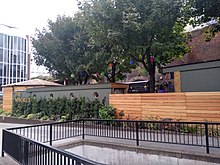
Minories is the name of a small former administrative unit, and also of a street in the Aldgate area of the City of London. Both the street and the former administrative area take their name from the Abbey of the Minoresses of St. Clare without Aldgate.
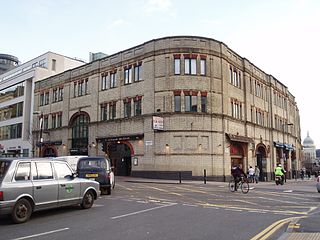
The Turnmills building was a warehouse originally on the corner of Turnmill Street and Clerkenwell Road in the London Borough of Islington. It became a bar in the 1980s, then a nightclub. The club closed in 2008 and the building was later demolished, replaced with an office building.
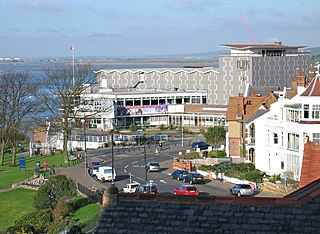
Cliffs Pavilion is a theatre, sports, exhibition and concert venue located on Station Road in Westcliff-on-Sea, Essex, England, a suburb within the city of Southend-on-Sea. It is the largest purpose-built arts venue in Essex, and the largest capacity of any theatre in the East of England. In 2006, the operation of Cliffs Pavilion, along with the Palace Theatre, were handed to HQ Theatres by Southend-on-Sea Borough Council. HQ Theatres merged with Trafalgar Entertainment in 2021. In February 2022, the Cliffs played host to He Built This City concert, a tribute to the murdered MP for Southend West Sir David Amess.

The Fridge was a nightclub in the Brixton area of South London, England, founded, in 1981, by Andrew Czezowski and Susan Carrington, who had run the Roxy during punk music's heyday in 1977. The Fridge closed on 17 March 2010 and has no link with Electric Brixton which opened in September 2011 and now occupies the building.

G-A-Y is a long-running gay nightclub brand, based at the Heaven nightclub in Charing Cross, London, owned by Jeremy Joseph.

The Twisted Wheel was a nightclub in Manchester, England, open from 1963 to 1971. It was one of the first clubs to play the music that became known as Northern soul.
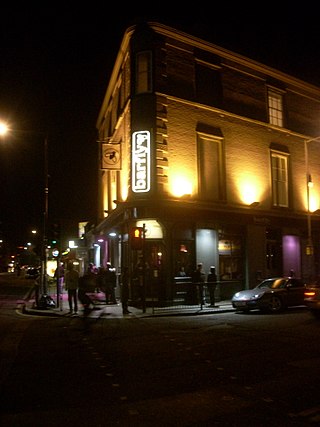
The Barfly was a chain of live music venues in the United Kingdom originally started by Nick Moore, Jeremy Ledlin and Be Rozzo on Valentine's Day 1997. Club nights and events tended to feature rock, alternative and independent music.

The Guvernment, formerly known as RPM, was a nightclub complex in Toronto, Ontario, Canada. It was also the name of one of the two main performance venues within the complex. The other venue was Kool Haus. Other smaller rooms within the complex included: The Drink, D'Luxe Lounge, The Orange Room, SkyBar, Charlies, Tanja and Acid Lounge. The Guvernment opened in 1996 and closed in early 2015. The Kool Haus venue became known for hosting the first ever concert performance by Canadian rapper and singer Drake.
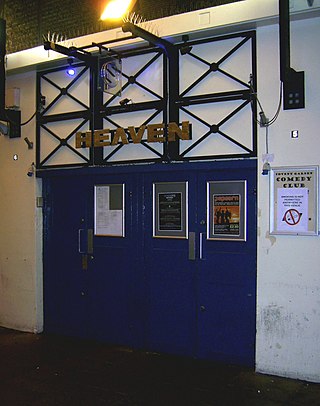
Heaven is a gay superclub in Charing Cross, London, England. It has played a central role and had a major influence in the development of London's LGBT scene for over 40 years and is home to long-running gay night G-A-Y. The club is known for Paul Oakenfold's acid house events in the 1980s, the underground nightclub festival Megatripolis, and for being the birthplace of ambient house.

The Phoenix Concert Theatre is a concert venue located at 410 Sherbourne Street in Toronto, Ontario, Canada.
XXL was a gay nightclub in London and Birmingham which catered to the bear sub-group. The club was founded by Mark Ames and his then partner David Dindol in 2000. They separated in 2005, after which Mark purchased his ex-partner's share of the club. It was the largest dedicated "bear" venue in the United Kingdom and the world. It was not just the bear scene's longest-running weekly disco but London's too, having not missed a night in over 16 years.
Hammerjacks was a music venue in downtown Baltimore which operated from 1977 to 2006. It was founded by Louis J. Principio III. The club attracted many big-name national acts, but also showcased many rising stars in the music world. The bands ranged from punk, glam, thrash and heavy metal acts most commonly associated with the venue to pop and alternative rock groups. The club was often frequented by hard core patrons and musicians donning big hair, leather, lace, spandex, and heavy makeup, and was considered a "hard rock shrine." Hammerjacks, however, attracted audiences with other attire as well.

The Café de Paris was a nightclub in the West End of London, active from 1924–41 and 1948–2020. It was located on Coventry Street, which runs between Leicester Square and Piccadilly Circus.

A nightclub is a club that is open at night, usually for drinking, dancing and other entertainment. Nightclubs often have a bar and discothèque with a dance floor, laser lighting displays, and a stage for live music or a disc jockey (DJ) who mixes recorded music. Nightclubs tend to be smaller than live music venues like theatres and stadiums, with few or no seats for customers.

The Birmingham Gay Village is an LGBT district next to the Chinese Quarter in Birmingham city centre, centred along Hurst Street, which hosts many LGBT-friendly businesses. The village is visited by thousands of people every week and has a thriving night life featuring clubs, sports bars, cocktail bars, cabaret bars and shops, with most featuring live entertainment including music, dancing and drag queens.
The Glasgow Cathouse is a long-established alternative music nightclub on Union Street in Glasgow. It is well-known for hosting live gigs, with globally successful, mainstream bands such as Oasis, Pearl Jam and Fall Out Boy have played there in their fledgling years.
Rebel is a nightclub and concert venue located on the Polson Pier in Toronto, Canada. Relaunched in October 2016 as Rebel Night Club, the complex is on the edge of Lake Ontario, overlooking the Toronto city skyline. The main room has a 65-foot stage with an installation of LED video walls, as well as outdoor grand terraces. The mezzanine hosts the central bar which includes built-in seating.
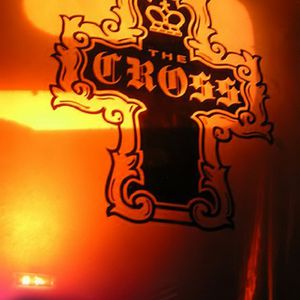
The Cross was a nightclub in York Way, Coal Drops Goods Yard, King's Cross, London, England between 1993 and 2007, closing on New Year's Day 2008.
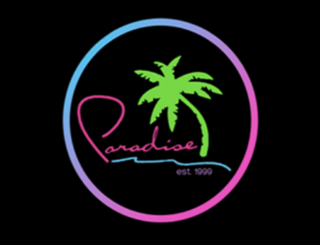
Paradise is a gay nightclub in Asbury Park, New Jersey. It is known for its fundraisers and drag shows, most notable of which is the annual Miss Paradise pageant. The club is integrated with the Empress Hotel; both are owned by record producer Shep Pettibone. Paradise's 1999 opening is credited as one factor that improved Asbury Park's struggling economy and drew the LGBTQ community back to the city after a period of local unrest. The venue is a popular Jersey Shore destination in the summer, and it has received praise for its welcoming atmosphere. After several months of closure due to the COVID-19 pandemic, Paradise reopened its outdoor pool and bar area in summer 2020.
Hot Mass is an electronic music dance party held weekly since December 2012 below Club Pittsburgh, a private gay club and bathhouse in Pittsburgh, Pennsylvania, United States. The event indirectly grew out of Pittsburgh's LGBT, disco, and electronic music subcultures of the 1970s, 1980s, and 1990s. Critics have noted the experience and quality of music at Hot Mass is difficult to find elsewhere in the United States, comparing it favorably to European nightclubs and parties, including Berghain.
